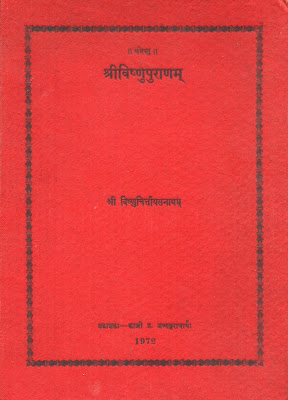Vishnu Purana with Vishnuchittiyam commentary
Vishnu Purana with Vishnuchittiyam commentary
The Vishnu Purana has a unique distinction among the 18
Puranas. It is the only one that is in answer to general
questions. The speaker in the Purana is obliged to talk about
the personality queried by the student. In the case of a
general question, the speaker is obliged to divulge the
highest truth, according to teachers like Adi Shankara. In his
works, Adi Shankara would refer to Sri Vishnu Purana as
simply "The Purana".
In just 6,000 verses, the Vishnu Purana has covered all aspects of philosophy, theology, history and the practice of the ancient Vedic religion. Both the Vishnu Purana and Srimad Bhagavatam seem to cover common ground like the stories of the 10 avatarams of Vishnu. But while the Bhagavatam has all the makings of a Hollywood climax in the Nrsimha avatara for example, where the Good and Almighty Nrsimha faces off the ultimate evil Hiranyakasipu, in the Vishnu Purana, the climax is reached when Hiranyakasipu apologizes to Prahlada. His death at the hands of Nrsimha is referred to only in passing.
Even description of the seasons set the tone for our mood, when fish suffering in the stream waters heated by the sun, is compared to a man suffering the results of his sins.
This particular edition of Sri Vishnu Purana includes a commentary called "Vishnuchittiyam" by Vishnuchitta, who is also known as 'Engalalvan' in Tamil. Vishnuchitta lived from 1097 to 1197 CE. He was the disciple of "Tirukurugai Piraan Pillaan" the Jnana Putra or spiritual son of Swami Ramanujacharya. He composed about half a dozen works elucidating the philosophical works of Swami Ramanujacharya. Only the Vishnuchittyam is extant today.
It clearly explains the harder to understand passages. For example, the Vishnu Purana explains that Vedic rites should not be performed in the presence of "naked people". Vishnuchittiyam explains that naked people in this context refers to people who have given up the performance of their daily religious duties as ordained by the Vedas. The other available commentary is called Atma Prakasha by Sridhara Swami, a follower of Vallabhacharya.
In just 6,000 verses, the Vishnu Purana has covered all aspects of philosophy, theology, history and the practice of the ancient Vedic religion. Both the Vishnu Purana and Srimad Bhagavatam seem to cover common ground like the stories of the 10 avatarams of Vishnu. But while the Bhagavatam has all the makings of a Hollywood climax in the Nrsimha avatara for example, where the Good and Almighty Nrsimha faces off the ultimate evil Hiranyakasipu, in the Vishnu Purana, the climax is reached when Hiranyakasipu apologizes to Prahlada. His death at the hands of Nrsimha is referred to only in passing.
Even description of the seasons set the tone for our mood, when fish suffering in the stream waters heated by the sun, is compared to a man suffering the results of his sins.
This particular edition of Sri Vishnu Purana includes a commentary called "Vishnuchittiyam" by Vishnuchitta, who is also known as 'Engalalvan' in Tamil. Vishnuchitta lived from 1097 to 1197 CE. He was the disciple of "Tirukurugai Piraan Pillaan" the Jnana Putra or spiritual son of Swami Ramanujacharya. He composed about half a dozen works elucidating the philosophical works of Swami Ramanujacharya. Only the Vishnuchittyam is extant today.
It clearly explains the harder to understand passages. For example, the Vishnu Purana explains that Vedic rites should not be performed in the presence of "naked people". Vishnuchittiyam explains that naked people in this context refers to people who have given up the performance of their daily religious duties as ordained by the Vedas. The other available commentary is called Atma Prakasha by Sridhara Swami, a follower of Vallabhacharya.













0 comments: